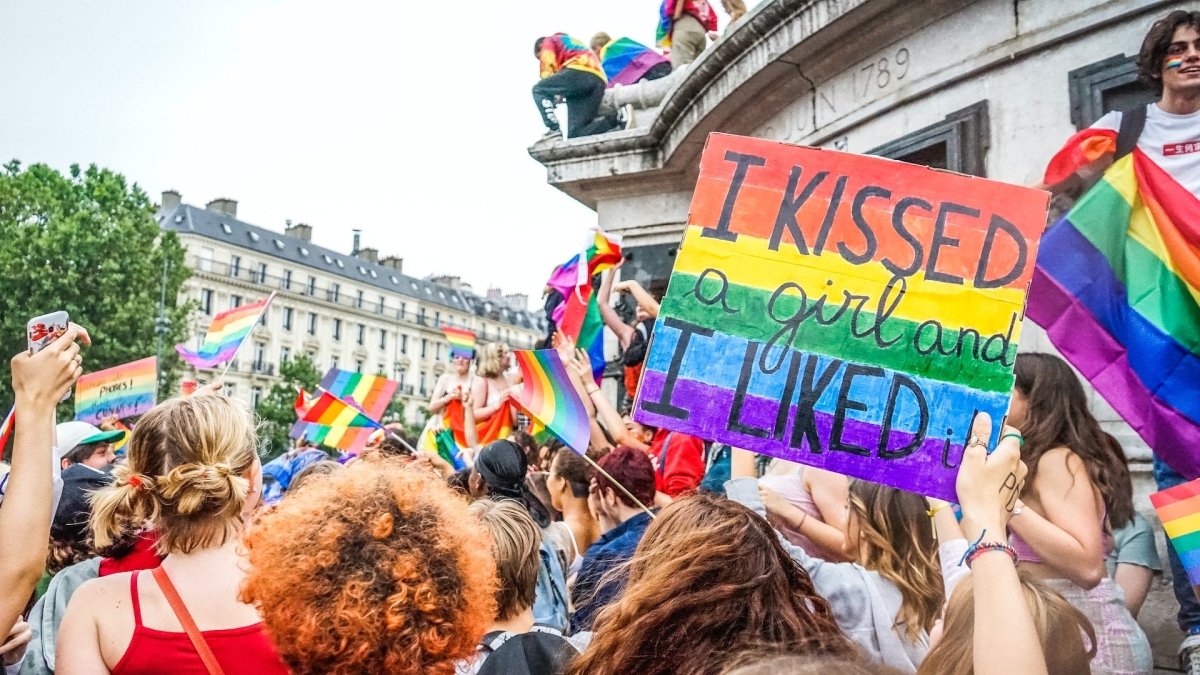Your cart is empty

LGBTQ+ Pride - Part 2
So far, our British summer has lived up to its reputation. Grey skies, wind, spots of rain, and a sweltering 19 C when the sun's out. However, that’s not so important. Summer means much more than the weather. It usually means it’s time for Pride somewhere in the world.
We’ve just turned the corner of massive Pride Parades in cities like Edinburgh, London, Bristol, and Brighton and Hove. There are still plenty of events where you can support local LGBTQ+ communities.
However, during times of celebration, it’s important to remember where we came from and how far we still need to go.
The Struggle for Global Gay Rights
LGBTQ+ people have been oppressed and marginalised throughout all of history. It’s been five decades since the Stonewall Riots. Police abuse and harassment at a pub in Greenwich Village were the straw that broke the camel’s back (sounds familiar).
Since then, we’ve come a long way. According to a recent report from the International Lesbian, Gay, Bisexual, Trans and Intersex Association (ILGA), there are still 64 countries that criminalise homosexuality.
In places like Iran, Saudi Arabia, Yemen, and Nigeria, the punishment for same-sex acts is death.

50 Years of Progress (Mostly)
British LGBTQ+ communities are in an endless battle for equal rights and safe spaces. The good news is that we’ve been heading in the right direction.
Things began to change with the passing of the Sexual Offences Bill 1967 decriminalised homosexual acts between two men over 21 years of age in England and Wales. Five years later, the First Gay Pride Rally was held in London in 1972. Many milestones ensued over the next several decades. However, they weren’t always positive.
The ratification of Section 28 of the Local Government Act of 1988 was a significant setback. It essentially banned the education, promotion, or acceptance of homosexuality from being taught in British schools. Section 28 got repealed in 2003.
For the most part, the 2000s have been onward and upward for LGBTQ+ rights.
Worrying Trends in the UK
We live in a post-pandemic world full of divisive and polarising populism. While this affliction is not unique to the UK, it has impacted our politics as much as anywhere.
It wasn’t that long ago that we were leading the way for LGBTQ+ rights in Europe. In 2015, ILGA-Europe ranked the UK number one. In their most recent Rainbow Map and Index, the UK had fallen to 17th out of 49 countries ranked.
Other issues likely stem from rising anti-LGBTQ+ sentiment in the country. Last July, YouGov conducted a poll on transgender rights. The group garnered opinions on toilet and dressing room usage, sports participation, gender reassignment, gender identification and other trans topics.

These findings showed an overall trend for the British public to be less accepting in 2022 than in 2018 and 2020.
Additionally, the UK government reported a rise in transgender hate crimes by 56% (sexual orientation hate crimes were up 41%) from 2021 to 2022.
Meet Nia
If you read this blog regularly, you know we have a tight relationship with many inclusive communities. One of these is Hackney Gladies Rugby Football Club. In a previous article, we talked with Zara about her experience as part of the British LGBTQ+ community.
This time up is Hackney RFC inside/ outside centre, Nia Watson-Campbell. Nia is Hackney-based but originally from Nottingham.
“My grandparents were of either the Windrush generation or just after. And quite a lot of Jamaican West Indian communities landed in Nottingham. So I still had quite a large black population growing up.”
Nia states she had quite a supportive upbringing. She “didn’t really have a coming out story.” Nia says, “I didn’t feel any different growing up. It’s never felt like a big deal. It’s never been binary for me. Be with who you want to be with.”
Nia studied international relations for her first degree and then joined the military. Why the military? “I wanted to do a job that took me to a lot of places and allowed me to meet a lot of different people.”
Women weren’t allowed to join combat ranks like the infantry at the time. Always read up for a challenge, Watson-Campbell signed up for the Royal Artillery to “be as close to the infantry as possible.”
After about seven years, Nia was gravitating towards something new.
A Career Transition
A passion for travel and diversity is what drives Nia. She states, “I was always interested “in why the world is as it is and why countries and states interact as they do.”
“I vividly remember having conversations with my parents about responsibility. [Telling me] to be the best version of myself and positively impact others.” A career evolution was in the cards. Nia explains, “I had a full circle moment of leaving the army and working with governments.”
Watson-Campbell works in the foreign office now. In the fall she’ll move to Brazil and will work for the British Embassy as a diplomat. “My job is to forge good relations with not only the Brazilians but everybody else that's based out there.”
For Nia, it’s all about collaborating to make a difference.
“We're in a world now where we look for one person to make massive change. For me, it’s actually by incremental gains from lots and lots of different people.”
Hackney Gladies

Nia has always been an athlete and involved in sports. Netball was her main sport. “I got into rugby pretty late in life, which is a shame. I wish I got into it much earlier.
Luckily, she found Hackney Gladies. “Part of the reason I was drawn to that rugby club was because of the level of inclusivity.”
As always, looks can be deceiving. “The equipment's awful. The pitch floods all the time. You don't have a clubhouse. But the spirit of the people keeps you coming back. I’ve stuck around because of the community they have built, whilst also still being a pretty competitive rugby team.”
Black Girls Ruck
Also known as BGR, Black Girls Ruck was formed back in June 2020 to “highlight Black Women and non-binary people in the sport of Rugby.” Nia is part of the podcasting team.
Speaking on why she got involved, “Black identity is not monolithic, we are not all the same. There shouldn’t be an expectation that I am fast, I can be a whole host of things – my gender and race are one part of my identity, but not all of my identity. It’s about allowing people to have differences and embracing those.”
BGR has also created the Black Girls Ruck Hardship Fund. The charitable scheme offers financial support for black women, non-binary people, and girls who want to try rugby. Funds go toward match subs, club membership, boots, shorts, socks and other things needed for participation.
And sometimes, it’s the little victories that keep us going. “Last week, we made a great achievement. We formed our first all-Black women's rugby team.” The all-Black team played in the Hackney Rugby’s Matt Elliott Cup last month.
Follow this link to support the BGR Hardship Fund.
Current State of LGBTQ+ Rights
Spending time on social media or doing a bit of online research should have all of us worried about trending anti-LGBTQ+ sentiment in the UK. “The issue comes down to the world. It's not just in the UK. You can look to France, you can look to the US the world feels like it's becoming slightly more polarised. There's less humanity and understanding on an individual level.”
“There's a huge amount of misinformation out there as well. I'm all for social media [...] I think people who solely rely upon their information [from] social media are fueled by populism. They’re not understanding the root cause of things.”
It’s getting to that root cause that Watson-Campbell believes is the solution. Nia continues, ”[Ask], why do I think the things I think as? Do I instantly feel a bit threatened? Why do I feel like that? Just have that moment with yourself. It’s an interesting space to be in. And it allows you to be more open to other people's opinions without feeling attacked.”
On Allyship
Nia believes that allies are crucial. “Allyship changes how people and communities can be and act. Just making sure that people have safe spaces is vital.” Watson-Campbell adds, “Donating to charities, saying hello, having a smile, all of that stuff is still touching people.”
So as an athlete what does Nia make of LGBTQ+ ally and footballer Jordan Henderson making his way to Saudi Arabia?
“I've worked in Saudi Arabia quite a bit as part of my job. And I think the problem, again, we just came back to, we came back to religion, right? [It’s] an autonomous country. And those are the views they have.”
“It'll be interesting to see what someone like Jordan Henderson does with some of that money. If you are willing to go there, will you still donate to charity, [and be a] part of grassroots projects?”
Nia says don’t judge too harshly. It’s best to wait and see what unfolds. “No one is perfect. We're all trying. We’re all in the same boat.”
On Beer
Like many at Hackney Gladies, Nia first encountered Sheep in Wolf’s Clothing Brewery as a post-match refreshment. “The go-tos were probably The Shetland Ponies and the Lager Day Saints.”
As a Black woman, did she ever feel self-conscious when ordering beer in a pub?
“Yeah, for sure. It was like, ‘Are you sure? Do you really?’ I’d be thinking, don't worry guys, I can drink a pint and I'm not gonna die.” Watson-Campbell expounds, “[Beer] should be available to everybody. If you want to drink IPAs, drink them.”
Nia also encourages more conscious drinking by way of low and no-alcohol beers. “It's great to be able to have a beer or a pint after work with colleagues and feel like you're socialising even if you don’t feel like drinking alcohol. So I think I'm a big advocate for it.”
Open Your Eyes
There’s plenty of disruption, misinformation and negative headlines in the world today. How can we hope to come out ahead on the other side of all the chaos?
Nia leaves us with a simple message:
“I think there have been negative connotations to being ‘woke’ recently. But actually, all that means is being awake, right? Just opening your eyes, you know, and keeping them open. Maintain a visual of the world that you live in; just be kind.
- Choosing a selection results in a full page refresh.


